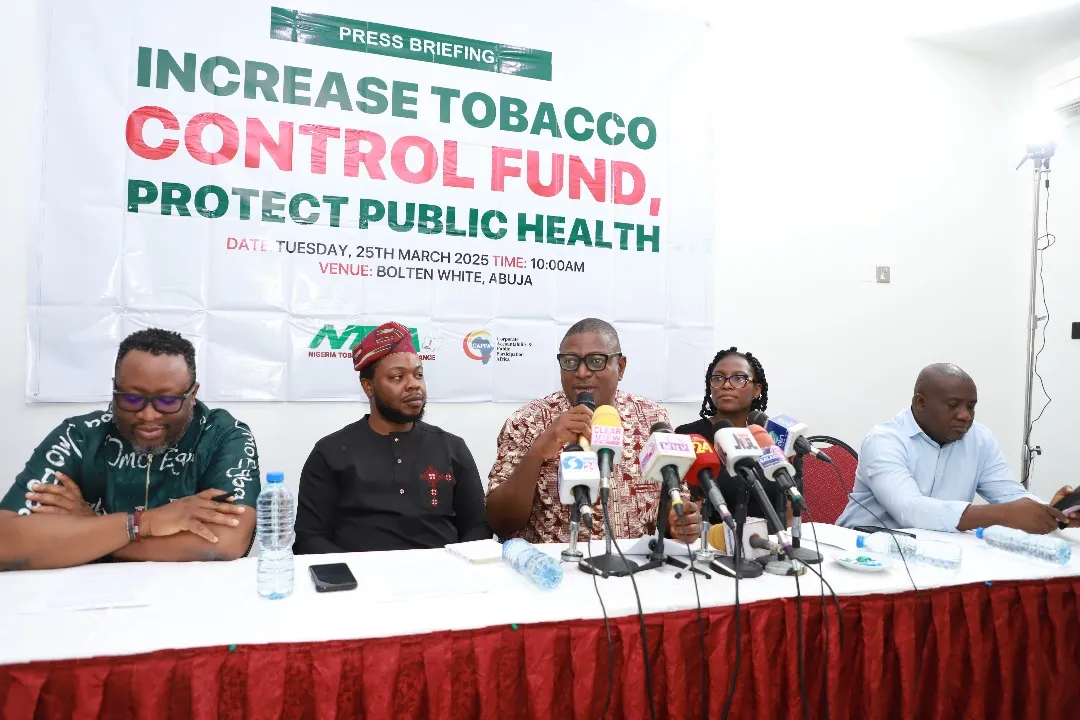904
By Tracy Moses
The Nigerian Tobacco Control Alliance (NTCA) and Corporate Accountability and Public Participation Africa (CAPPA) have urged the Federal Government to significantly raise the allocation for the Tobacco Control Fund (TCF) in the 2025 national budget.
The organizations are advocating for an increase from the current allocation of N13 million to at least N300 million to effectively tackle the public health crisis caused by tobacco use.
The call was made during a joint press conference held in Abuja on Tuesday, where representatives of both organizations emphasized the pressing need for a more robust financial commitment to tobacco control in the country. While acknowledging the increase from N10 million in 2024 to N13 million in the 2025 budget, the NTCA and CAPPA warned that the current allocation remains insufficient to adequately implement the provisions of the National Tobacco Control Act (NTCA) 2015.
Citing tobacco use as public health enemy number one responsible for millions of preventable deaths worldwide, including that of thousands of Nigerians yearly, the groups added that confronting this public health emergency requires financial commitment and full operationalisation of the TCF.
Akinbode Oluwafemi, CAPPA’s Executive Director, said: “We urge the government to prioritise the Tobacco Control Fund, increase the allocation to at least N300million as an urgent measure to stop the tobacco industry from causing more damage. The lives of Nigerians are at stake.”
“While the government continues to delay adequate funding for the Tobacco Control Fund, the tobacco industry is aggressively marketing new, stylish tobacco products to the public. These products, including vapes (electronic cigarettes), electronic nicotine delivery systems (ENDS), heated tobacco products (HTPs), snus, and oral nicotine pouches, are falsely presented as ‘safer’ or ‘less harmful’ alternatives to traditional tobacco use.
The industry’s strategy is clear: target impressionable youth, hoping to replace the millions who die or suffer due to tobacco use with a new generation addicted to these harmful products,” said Oluwafemi.
The Tobacco Control Fund (TCF), established under Section 8 of the Nigeria Tobacco Control Act (NTCA) of 2015, is a key component of the nation’s comprehensive strategy to mitigate the harmful effects of tobacco use. The fund is primarily financed through allocations from the national budget, fines imposed for violations of tobacco regulations, and contributions from development bodies dedicated to tobacco control.
The TCF plays a crucial role in empowering the National Tobacco Control Committee (NATOCC) and the Tobacco Control Unit (TCU) to fulfill their mandates. It also supports various government agencies in implementing health promotion campaigns, tobacco control initiatives, and enforcement actions aimed at ensuring strict adherence to tobacco laws and regulations.
Olawale Makanjuola, the Alliance Coordinator of the NTCA, has emphasized the need for transparency in the management of the Tobacco Control Fund (TCF). He warned that merely increasing the fund allocation in the budget, without ensuring its efficient use in tobacco control efforts, would ultimately be counterproductive.
Makanjuola urged the government, particularly the Federal Ministry of Health and Social Welfare (FMOHSW), to adhere strictly to the provisions of the National Tobacco Control Act in the administration of the TCF.
“The National Tobacco Control Act mandates that funds allocated for tobacco control in the national budget, or sourced from any other means, must be deposited into the Tobacco Control Fund account for proper utilization. We strongly call on the Ministry to provide regular updates regarding the Fund, including its balance, the sources of the funds, and the details of its expenditures,” Makanjuola stressed.
Mr Michael Olaniyan, the Country Coordinator for the Campaign for Tobacco-Free Kids, echoed the concerns of NTCA and CAPPA, emphasizing the grave consequences of Nigeria’s failure to take decisive action on tobacco control.
“Each day Nigeria neglects to properly fund tobacco control efforts, more lives are lost. Our youth continue to be targeted by harmful marketing, while our healthcare system strains under the burden of preventable diseases. The cost of inaction is seen in cancer wards filled with young patients and a future that is being sacrificed to addiction and premature death.”
“If the government does not act now with a substantial budgetary allocation to the To bacco Control Fund, they are not just failing in local and global commitment to health policies, we are failing our people. The time to seriously fund TC is now,” Olaniyan said.
Referencing how poor funding restricts tobacco control interventions, the statement noted that effective sensitisation campaigns need robust media outreach, deep community engagement, and active coordination with various stakeholders across the country, all of which require substantial funding to reach a broad audience and create impactful messages.
Further more, “Enforcement and monitoring efforts are critical in countering industry interference and ensuring adherence to tobacco control regulations. This includes prosecuting violations, protecting smoke-free environments, and enforcing the ban on tobacco advertising, promotion, and sponsorship, among other key actions.”
CAPPA and NTCA have highlighted that, despite persistent calls from stakeholders, the Tobacco Control Fund (TCF) has not yet been fully implemented. This delay has allowed tobacco companies to exploit Nigeria’s weak monitoring systems, exposing the public to the unchecked dangers of online tobacco marketing. Additionally, companies are manipulating corporate social responsibility (CSR) initiatives to gain favor with public health authorities, ultimately undermining tobacco control laws and enticing more individuals into tobacco use.
“Currently, Nigeria’s tobacco control efforts are heavily reliant on donor funding, which is not a limitless resource. Many countries were caught off guard by the Trump Administration’s decision to cut funding from the United States Agency for International Development (USAID). Nigeria must not wait for a similar disruption before taking decisive action to protect the health of its citizens from the growing influence of the tobacco industry. It is crucial for the government to increase the tobacco control fund and ensure sustainable efforts in the fight against tobacco-related harm.”



